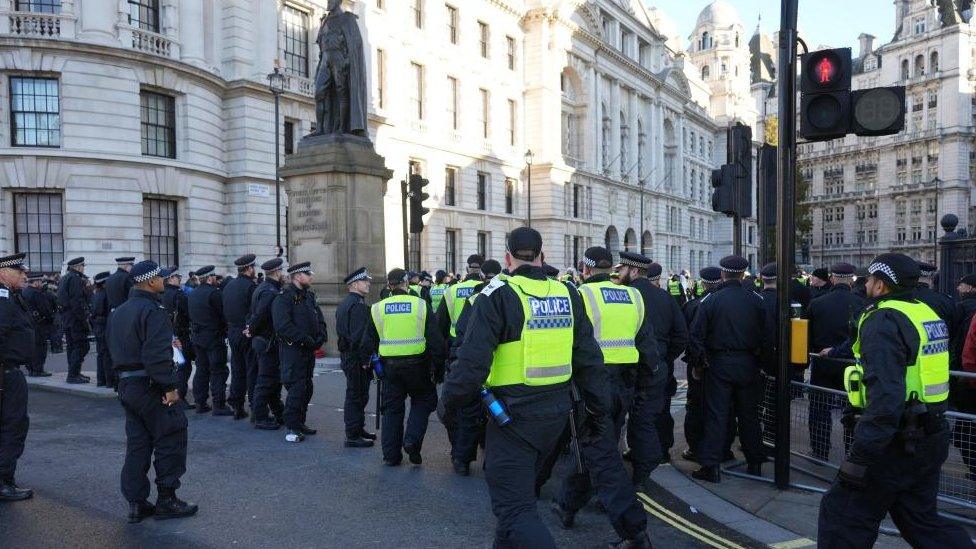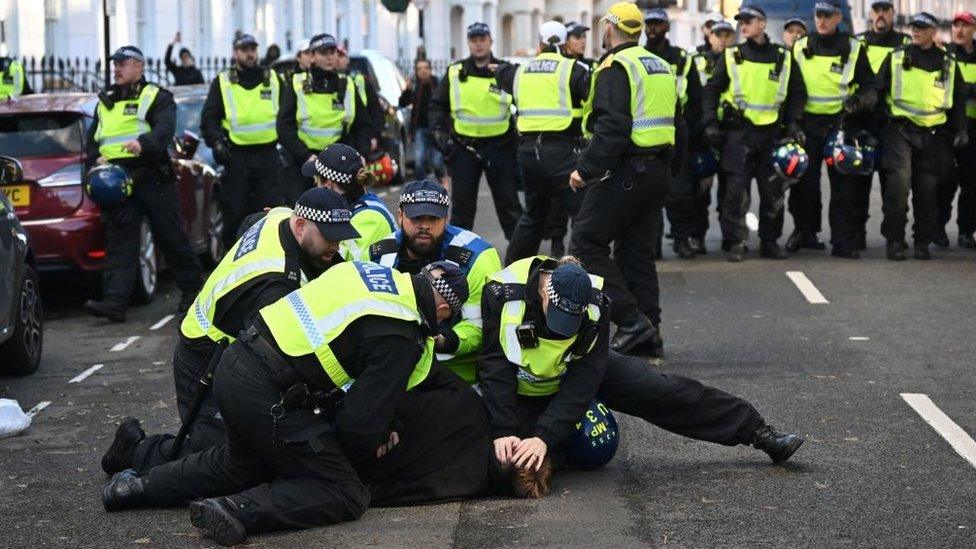More powers for policing protests considered by government
- Published

The government is looking to strengthen police powers to deal with protesters, following demonstrations in London.
Right-wing protesters clashed with officers on Saturday and some members of the huge pro-Palestinian march were accused of using antisemitic slogans.
Suella Braverman is under continued pressure after criticising the police ahead of the Armistice Day march.
Ministers are thought to be considering changes, such as lowering the threshold for when police could apply for a ban.
And more conditions could also be imposed on demonstrators for public safety.
The Sun has reported these could include stopping people climbing on statues,, external bus stops and scaffolding during protests, tightening the laws around smoke bombs and flares and against glorifying terrorists.
The new measures are reportedly being "seriously" examined by the government.
Any change would require new laws but could be included in criminal justice legislation already making its way through the Commons. It is likely to result in more intense political debate as it worked its way through Parliament.
Downing Street hit pause on deciding Mrs Braverman's political future on Thursday while it focussed on the weekend's events but with Remembrance commemorations passed and a clearer picture of what happened on Saturday, pressure will resume on Prime Minister Rishi Sunak to send a clear message on his home secretary.
Some opposition MPs have called for her to be sacked, and a number of ministers have distanced themselves from her comments.
Mrs Braverman wrote an article in the Times last week criticising the police, which was published without the changes No 10 had asked for.
She has since faced accusations that the piece - which claimed the police "largely ignore... pro-Palestinian mobs" - had emboldened the counter-protesters.
Labour say she she stoked tensions on Saturday by accusing the police of bias.
On Sunday, Mrs Braverman broke a silence of almost 48 hours to thank police officers who were faced with violence and aggression from "protesters and counter-protesters". But she stood firm on her position on the pro-Palestinian marches saying that "week by week, the streets of London were being polluted by hate, violence and antisemitism".
Mr Sunak said those involved in crimes at the demonstrations on Saturday must face the full force of the law, with the "despicable actions of a minority of people" undermining "those who have chosen to express their views peacefully".
The Metropolitan Police said 145 people were arrested - the "vast majority" of whom were counter-protesters near the Cenotaph war memorial - and nine officers were injured.
The force condemned violence from the counter-protesters, who it says set out to confront the pro-Palestinian march.
Seven men have been charged over disorder for offences including inciting racial hatred.
The pro-Palestinian demonstration saw an estimated 300,000 people march through central London calling for a Gaza ceasefire. It was the biggest UK rally since the war between Israel and Hamas began on 7 October.
Police added while the march itself did not see such physical violence, other serious offences were being investigated, including antisemitic hate crimes.
Reshuffle talk
A reshuffle of Mr Sunak's top team has been rumoured to be on the cards for months.
The downside for the prime minister of sacking Mrs Braverman would be that it would anger her supporters, who are predominantly on the right of the party. One Tory MP said efforts were already under way to lobby to keep her in the job.
Mrs Braverman has also never hidden her ambitions to one day be the party leader and sacked ministers have been known to be a thorn in the side of their former bosses.
On the other hand, Mr Sunak could decide keeping her on outweighs the controversies and he could choose to back her. In order to avoid claims of weakness though, he'd have to find a convincing reason for why she went ahead and published a newspaper opinion piece that hadn't been cleared by Downing Street.
He would also frustrate those Tory MPs who have tired of her knack for attracting controversy and are starting to use phrases like "unhelpful" and "brand damage" about her.

Sign up for our morning newsletter and get BBC News in your inbox.

- Published12 November 2023
